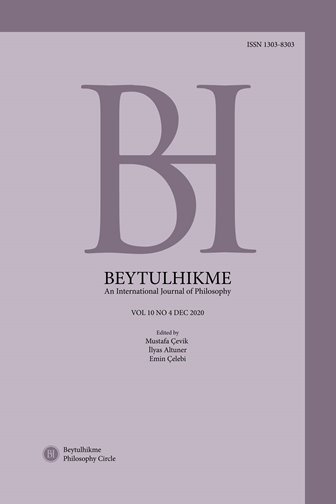Author :
Abstract
Heidegger sistematik bir etik teorisi kurmamış, moral değerleri ontik seviyede görmüş ve sorgulamasını ontolojik alana hasrederek etikle ilgili alandan uzak durmuştur. Buna rağmen onun ontolojisi ile etik arasında bağ kurma fikri bir beklentiye dönüşmüştür. Heidegger’deki etik konusundaki çalışmalar genellikle Varlık ve Zaman’da etiğin konumunun yol gösterici olmaması nedeniyle ikinci dönemine odaklanır. Ancak Heidegger’in erken dönemi olan Varlık ve Zaman’ın oldukça etik imalarla yüklü kavramlarının daha geniş bir analizi bazı etik kodların çıkarımına imkan sağlayabilir. Biz bu çalışmada Varlık ve Zaman’daki “Başkası, Herkes, İhtimam, Vicdan ve Sorumluluk” kavramları çerçevesinde bir etik taslak arayışında olacağız. Bu kavramlar onun müdahalesiyle geleneksel etik kalıplarından çıkmış olsa da Varlık ve Zaman’ın anti-etik tavrını ante-etik bir tarzda okumayı mümkün kılacak potansiyel taşımaktadırlar. Bu potansiyelleri tartışmak bize etiği de temellendirecek sahih bir dünya kavrayışı için güncel bir değerlendirme imkanı sunabilir.
Keywords
Abstract
Heidegger did not establish a systematic theory of ethics, he saw moral values at the level of ontic, and avoided the ethics-related field by devoting his inquiry to the ontological field. However, the idea of linking his ontology with ethics has turned out to be an expectation. Studies on the ethics of Heidegger are generally focused on the second period because the position of ethics in Being and Time is not guiding. However, a broader analysis of highly ethical implications-bearing concepts of Heidegger's early Being and Time may allow some ethical codes to be deduced. In this study, we will be looking for an ethical draft within the framework of the concepts of “The Other, Everyone, Exactness, Conscience, and Responsibility” in Being and Time. Although these concepts have diverged from traditional ethical patterns with his intervention, they have the potential to make it possible to read the anti-ethical attitude of Being and Time in an ante-ethical manner. Discussing these potentials can provide us with an up-to-date assessment of a sound world understanding that will also lay a foundation for ethics.
Keywords
- Bolt, B. (2010). Yeni Bir Bakışla Heidegger. (Çev. M. Özbank). İstanbul: Kolektif Kitap.
- Geniusas, S. (2015). The Question of Ethics in Heidegger’s Being and Time. Exis- tenzphilosophie und Ethik. (Hrsf. H. Feger & M. Hackel). Berlin: De Gruyter, 313-328.
- Heidegger, M. (2008). Varlık ve Zaman. (Çev. K. H. Ökten). İstanbul: Agora Ki- taplığı.
- Hodge, J. (1995). Heidegger and Ethics. London: Routledge.
- Johnson, P. A. (2013). Heidegger Üzerine. (Çev. A. Esenyel). Ankara: Sentez Yayın- cılık.
- Levinas, E. (2010). Sonsuz’un Etiği. (Çev. H. Arslan). Çağdaş Filozoflarla Söyleşiler: Kıta Felsefesi Tartışmaları. İstanbul: Paradigma Yayınları, 75-96.
- Levinas, E. (2012). Felsefe ve Sonsuz Fikri. Fikir Mimarları Dizisi: Levinas. (Haz. Ö. Gözel). İstanbul: Say Yayınları, 133-151.
- Logar, T. (2011). Grounding Ethical Norms in Heidegger’s Mitsein. Balkan Journal of Philosophy, 3, 187-196.
- Miyasaki, D. (2007). A Ground for Ethics in Heidegger’s Being and Time. Journal of the British Society for Phenomenology, 38, 261-279.
- Mulhall, S. (1998). Heidegger ve 'Varlık ve Zaman'. (Çev. K. H. Ökten). İstanbul: Sarmal Yayınları.
- Paley, J. (2000). Heidegger and the Ethics of Care. Nursing Philosophy, 1, 64-75.
- Schalow, F. & Denker, A. (2010) Historical Dictionary of Heidegger’s Philosophy. Toronto: The Scarecrow Press.
- Young, J. (2017) Heidegger’in Geç Dönem Felsefesi. (Çev. E. Korkut). İstanbul: Dergâh Yayınları.





